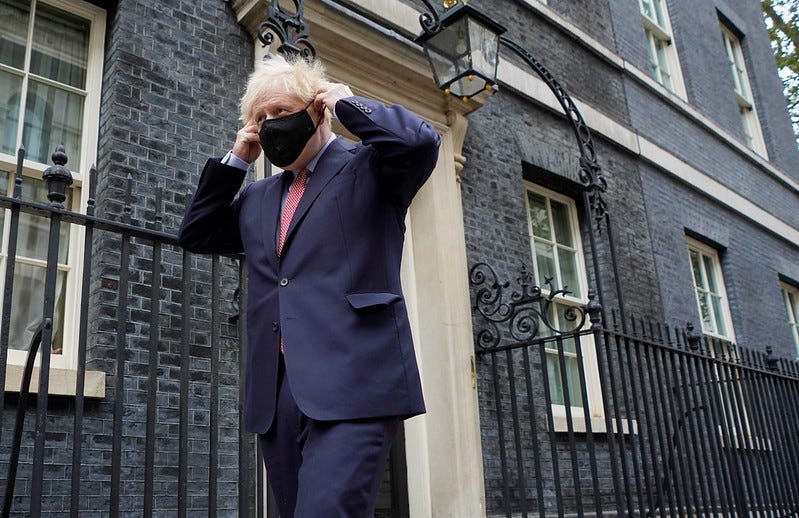ZEUS: The UK just made a major climate commitment
Welcome to a special edition of Callaway Climate Insights to examine the UK's 10-point climate plan announced today. Please enjoy and share.
(David Callaway is founder and Editor-in-Chief of Callaway Climate Insights. He is the former president of the World Editors Forum, Editor-in-Chief of USA Today and MarketWatch, and CEO of TheStreet Inc.)
SAN FRANCISCO (Callaway Climate Insights) — It’s been a bad few weeks for UK Prime Minister Boris Johnson, with a brutal Covid lockdown announced and rising controversy as a messy Brexit approaches. So it was almost inevitable that Johnson would double-down on a climate play to inject some political and economic hope. In the process, he made a major climate commitment.
The 10-point plan he announced in the Financial Times included one bold new auto emissions scheme, two previously announced renewable investments, three financial commitments to nuclear energy, carbon storage, and aviation/maritime improvements, and four pure pledges to turn the island green. Nothing about a partridge in a pear tree, though he did promise to plant 30,000 hectares of trees.
The plan, along with the promise of 250,000 new jobs to build a green recovery from Covid, captured the daily news cycle as everyone from Greenpeace to the opposition Labour Party took their shots. But politics aside, it’s at least a step forward.
After a month when the EU and China both announced massive initiatives to be carbon net zero by 2050, and Joe Biden’s climate presidency began in earnest with climate calls to world leaders, an assertion from the UK was badly needed.
“How marvelous seeing these great, big, bold statements by the EU and, in its own very British way, that the government would say this,” said Jonathan Maxwell, founder and CEO of Sustainable Development Capital LLP in London. “It’s exciting to see government policy come together with the capital markets.”
Maxwell, whose company invests in energy efficiency deals, was drawn to the pledge of £1 billion ($1.33 billion) toward insulating homes and public buildings. While a large part of that could simply be exchanging heat pumps for gas heating, there is a massive opportunity in the UK to refit public buildings in municipalities, and in hospitals and the National Health System in general, he said.
Johnson reiterated a promise to quadruple the UK’s capacity for wind energy, making the UK “the Saudi Arabia of wind,” especially in the North Sea. He also somewhat controversially said the government would invest £525 million in new nuclear power, aligning the UK with Eastern European governments such as Hungary and Poland, who claim they need nuclear power to help transition from coal.
But the big part of the plan — the major commitment — was certainly the pledge to move Britain off fossil-fuel emissions for autos by 2030, some 10 years sooner than previously pledged. The government will provide grants for cars and for charging points throughout the union. Certain hybrid cars will be given until 2035. See here how it will affect electric vehicles.
This pledge alone would have been worthy of the news cycle, as it puts the UK in the forefront of plans to eliminate gasoline and diesel emissions. California recently put in place plans to ban sales of gasoline autos and trucks by 2035. Europe and China are moving fast in that direction as well. Having lived in the UK, and now living in California, I’d put the UK’s chances of pulling this off well ahead of the Golden State, even with its political troubles.
There were also vague nods toward supporting public transportation, biking and walking, and an attempt to make the City of London the global center of green finance. That is exemplary, but the City is well behind in these efforts. How its capital markets shape up in the next few years with green financing initiatives will be a story well worth watching.
The UK has been conspicuously absent from the international climate story, which will move fast in coming months with Biden’s administration competing with China and the EU for advancements. While this plan felt somewhat bundled together, and will certainly be lost in the coming days of Covid lockdown controversy, it was refreshing to see it put on paper and articulated.
If Britain only pulls off the autos portion of the plan, it will be a big step forward. And an example for other countries.
As Johnson and Britain head into unchartered political waters with Brexit in the next few months, a guiding star of global climate solutions could keep them anchored to the international community in ways that even the most hardcore Brexiteer might not expect. In the battle against climate change, there are no islands.


